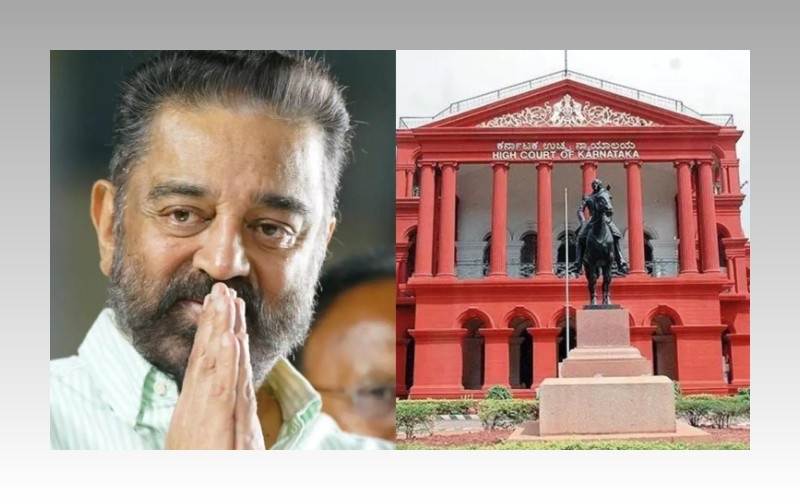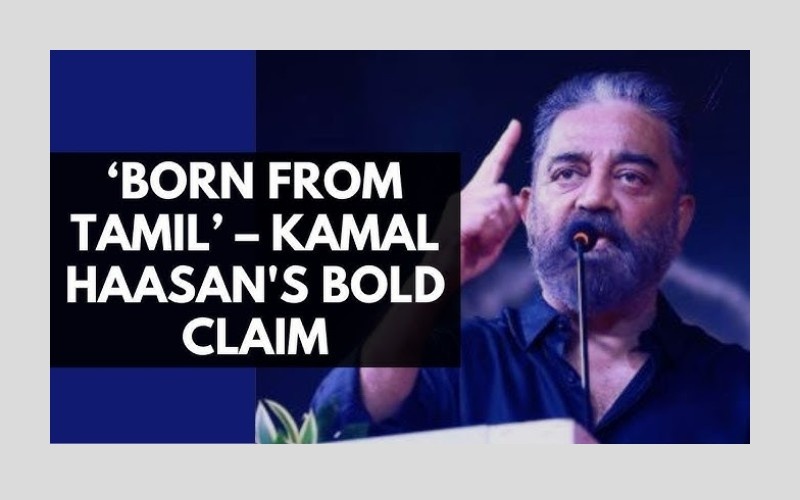Introduction: When Words Stir Nations
Because in India, languages are a key part of culture, even little mistakes by celebrities can result in strong criticism. That’s what happened when veteran star Kamal Haasan was involved in a controversy for his opinions about the origins of the Kannada language. The event, taking place at a media event for Thug Life, rapidly created a major political and cultural problem with people talking about it all over media, regional film industries and courts.
The Spark: What Kamal Haasan Actually Said
At a public gathering about Thug Life, Kamal Haasan declared that “Kannada is the product of Tamil.” Although, it appeared to be an academic or academic right, it caused outrage primarily in the Karnataka region. Several listeners felt the remark put down the importance of the rich culture and history of the Kannada language. People who heard it argued that the wording made the language appear less important since it has a long history and literature behind it.
The Fallout: Protests, Boycotts, and Bans
Karnataka acted promptly in the situation. Thug Life would not be allowed to release in Karnataka, the KFCC said, unless Kamal Haasan apologized to the people. People in Bengaluru and other cities went out onto the streets, burned images of the actor and wanted him to apologize. A number of Kannada organizations argued that Haasan insulted their language and as a result also hurt their identity.
The row went all the way to the courts. The Karnataka High Court on its own initiative took up the matter and asked if Haasan was allowed to make such claims about the origin of Kannada. It was highlighted in court that Kannada has rich traditions and a long history, similar to that of Tamil and such statements could damage the culture greatly.
Haasan’s Response: Regret, But No Apology
Kamal Haasan did not give an official apology, because he believes in his ideals. He tried to soften some of the blow. He sent a letter to the KFCC, saying he was sorry if anyone misunderstood him or was upset by his words. He emphasized that his words were meant in a respectful way and he valued both Kannada and its speakers deeply. Still, he stuck to what he said, saying the statements were meant for scholarly discussions and not public consumption.
Not apologizing in a formal way made the situation worse. Some thought Haasan was brave to remain firm against what others wanted, but many also thought he failed to show humility and unite the two language groups.
Social Media Reactions: A Polarized Debate
Like expected, the conflict was highly visible on social media platforms. Hashtags calling for action against Kamal Haasan and Karnataka thugs went viral on X (what Twitter used to be called). Many Haasan fans supported him by launching a different campaign, labelling him a hero for his knowledge and audacity to talk out against corruption.
Internet users saw lots of memes, videos and think-pieces. Certain Kannada users urged others to boycott any films by Kamal Haasan, whereas others wanted people to discuss the history of language in a less emotional way. Not only did the debate cause discussion about politics, but it also brought up the subject of regional identity, pride and the role of language in India.
Historical Context: The Tamil-Kannada Linguistic Connection
Getting a clear picture of the controversy means exploring how Tamil and Kannada are related historically and linguistically. Tulu and Kannada belong to the Dravidian language family together with Telugu and Malayalam. Even though Kannada and Tamil have common roots, they have independent lines of origin.
Tamil literature began far earlier than those of other Dravidian languages and dates back to 500 BCE. Unlike Malayalam, Kannada’s roots go back to the 5th century with some of its earliest inscriptions and its most notable work, Kavirajamarga, appeared in the 9th century. Most scholars believe that both languages grew separately, although they could not avoid influencing each other throughout their long history because of their closeness in distance.
As a result, the way Haasan explained the matter may come from his understanding of linguistics, but his straightforward claim which puts Kannada second, made many Kannada-speaking people feel offended and unhappy.

The Role of Celebrities in Cultural Discourse
The Kamal Haasan case brings this question to mind: What is appropriate for public figures to do and say in touchy cultural debates? Being both an actor and politician, Haasan attracts millions of viewers. What he says is very important. Having the freedom of speech which he does, means he should consider the appropriate circumstances and meaning—especially when he talks about language, religion and caste.
Haasan has faced controversy more than once. He has frequently made the news for his strong opinions on religion, politics and films. Much of his films deal with strong philosophical or social ideas. This example of the controversy is part of a larger pattern where art meets activism and a simple promotional event for a film can cause country-wide debates.
Industry Impact: Will Thug Life Suffer?
The main drama is centered on Thug Life, the much-awaited film by Kamal Haasan directed by Mani Ratnam. The film brings together two well-known actors in Indian cinema which makes people hope for a great experience. Because of the controversy, the film may not do as well in Karnataka, a major regional market.
Should the KFCC’s decision be upheld, Thug Life is likely to encounter problems in Karnataka, with its release possibly delayed and its promotion possibly limited which could affect box office revenue. There’s a possible threat of wider conflict in the South Indian film industry, since regional film organizations might need to issue statements or support one or the other.
Political Undertones: Identity, Pride, and Populism
Of course, different political groups have entered this debate, especially as elections are about to be held in Karnataka. Different politicians mentioned the controversy. Some won the support of their constituents using regional pride and others believed Haasan spent too much time trying to use his intellectual status, not caring about public opinion.
When identity politics and language meet in a nation, these moments are used by political groups to either rally followers or criticize people with different opinions. Haasan is not running for office now, yet his party Makkal Needhi Maiam wants to expand past Tamil Nadu, meaning his remarks matter more nationally.
Cultural Implications: Beyond Kannada and Tamil
It is not just a dispute between people from Tamil Nadu and Karnataka. The book points out the dilemma in India’s multilingual democracy: how to encourage unity without making diversity disappear. It proves that offending local tradition by talking without first understanding the details seems to wound regional pride very quickly.
Beyond communication, language lets people express their pride, ancestry and self-regard. Any comment in India about languages being ranked somehow can upset people because uniting states on language was a key post-Independence effort.
Moving Forward: What Could Have Been Done Differently?
It might have been avoided if Kamal Haasan’s statements were presented in a wiser way. Rather than only speculating, Haasan could have mentioned the works of experts, recognized the separate development of Kannada and underlined the value of respecting both languages equally.
At the same time, the harsh backlash—which includes threats, bans and legal actions—points to a reduced room for important debate in today’s society. While holding celebrities accountable is necessary, making space for thought-provoking academic and cultural dialogues which might stray on occasion, is important as well.
Conclusion: A Teachable Moment
Looking back, the situation involving Kamal Haasan can be used to guide and inform artists, politicians, members of the judiciary and ordinary people. It highlights how we try to meet the challenge of combining free speech with respect for Indian culture. It teaches us that language, though it can unite, can instead split communities if not handled carefully.
The incident might make Kamal Haasan aware that his statements, thanks to his fame, can have a huge effect on a wide audience. For people in Karnataka and Tamil Nadu, this call is to think about such instances instead of only reacting emotionally. For Hollywood, it shows that current issues may unexpectedly crush a film’s vision.
Thug Life is currently in a state of limbo in Karnataka and the debate is still going on. If the discussion becomes more constructive or destructive depends on what happens going forward.
Postscript: Why This Moment Matters in the Long Run
What sets this controversy apart is not just the celebrity involved or the specific languages at play—it’s the broader cultural moment it reveals. In an increasingly polarized world, the lines between opinion, offense, and outrage are growing thinner. As India continues to assert its diversity on the global stage, internal cultural coherence must be built on mutual respect, not competitive pride.
Kamal Haasan’s remark—perhaps academic in intent but clumsy in delivery—has become a flashpoint for deeper frustrations about representation, respect, and regionalism. It’s a reminder to public figures to tread carefully and to audiences to respond thoughtfully. As India’s film industry becomes more pan-Indian in its reach, such moments may become more frequent, but they also offer an opportunity to build bridges across cultures rather than burn them. For now, Thug Life waits in the wings, but the cultural conversations it sparked are far from over.














